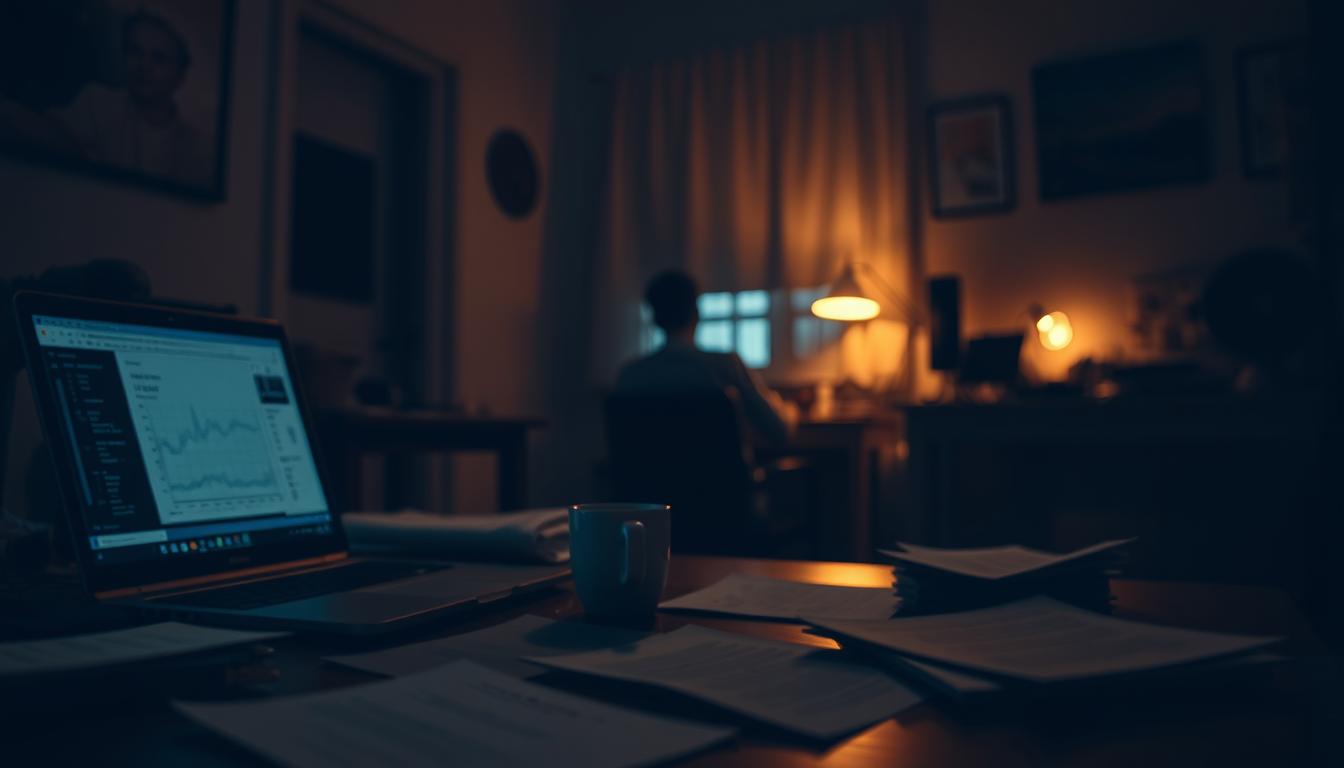Scientists have found a link between eating at night and how well we sleep. Studies show that eating before bed can change how easily we fall and stay asleep. This finding challenges old ideas about snacks and sleep.
In today’s world, many people eat late. Work, family, and fun often mean dinner is after dark. Snacks while watching TV or working on computers are common.
Research shows eating at night affects our sleep in surprising ways. Knowing this can help us change our evening habits for better health.
Understanding Late-Night Eating Habits
Nighttime food cravings are more than just hunger. They show our body’s complex tie to stress, emotions, and daily routines. These eating patterns affect millions worldwide, impacting sleep and health. Knowing the causes helps tell harmless habits from serious issues like night eating syndrome.
The psychology behind eating at night involves many factors. Our busy lives often lead to eating late, and stress can make us seek comfort in food. Spotting these patterns is key to healthier food and sleep habits.

Common Reasons for Late-Night Snacking
Emotional eating is a big reason for eating at night. After stressful days, many seek comfort in food. This need grows stronger in the evening when stress peaks.
Boredom also drives late-night eating. The evening lacks daytime activities, so people turn to food for fun. It’s a way to fill the quiet hours.
Sometimes, real hunger leads to eating at night. This is especially true for those who miss meals or eat too little during the day. The body tries to make up for it in the evening.
Poor sleep makes eating at night worse. Bad sleep messes with hunger hormones, making us crave food at bad times. This can lead to night eating syndrome, where most calories are eaten after dinner.
Foods Most Often Consumed at Night
Sweet treats like ice cream, cookies, and chocolate are top choices at night. They give quick energy and make us feel good, appealing in the evening.
Salty snacks like chips and nuts are also popular. They offer a satisfying crunch and taste, comforting after a long day.
Comfort foods and leftovers are another big group. They’re easy to eat and offer a sense of familiarity and convenience, especially when we’re tired.
- Dairy products like milk, cheese, and yogurt
- Carbohydrate-rich foods including bread, pasta, and cereal
- Processed snacks with high sugar or salt content
- Leftover meals from earlier in the day
Cultural and Social Influences
Family traditions shape our eating at night. Many cultures have evening snacks or late dinners as part of their routine. These habits often stick with us into adulthood.
Social media and entertainment also encourage eating at night. TV shows, movies, and online content often show snacking as fun and normal, influencing our habits.
Work schedules and social plans also affect when we eat. People with non-traditional work hours or busy lives often eat at odd times. These habits can become unhealthy if not managed.
Knowing these influences helps us see when our eating habits might be a problem. Recognizing these signs is the first step to making better choices for our eating and sleep.
The Science of Sleep Quality
Sleep quality is more than just how long you sleep. Scientists have found key factors that show if sleep really helps your body and mind. This is why some people feel refreshed after seven hours, while others feel tired even after more sleep.
The link between sleep and health is deeper than we think. Bad sleep quality can lead to many health problems. It can affect how well you make decisions and how strong your immune system is.

What Constitutes Good Sleep Quality?
Good sleep quality has four main parts. Getting the right amount of sleep for your age is important. Adults usually need seven to nine hours.
Sleep efficiency is how much time you actually sleep versus lying awake. Healthy sleepers sleep 85% of the time they’re in bed. So, if you’re in bed for eight hours, you should sleep for at least six hours and forty minutes.
How quickly you fall asleep is another key factor. Most people should fall asleep in 15 to 20 minutes. If it takes longer, it might mean you’re stressed or anxious.
The number of times you wake up at night also matters. Brief wake-ups are okay, but too many or long ones can hurt your sleep quality. This is when sleep deprivation often happens.
The Sleep Cycle Explained
Your brain goes through different sleep stages every 90 to 120 minutes. Each stage helps your body and mind recover. Knowing about these stages helps us understand why sleep is so important for health and performance.
Light sleep stages one and two make up about 50% of your sleep. Your heart rate and breathing slow down, and your body temperature drops. These stages prepare you for deeper sleep.
Deep sleep, or slow-wave sleep, is crucial for recovery and memory. It’s when your body grows and your immune system gets stronger. This is why it’s so important for your body to get enough deep sleep.
REM sleep is when you dream and your brain processes information. It’s important for emotional health, creativity, and learning. Your brain makes long-term memories during REM sleep.
When you don’t get enough sleep, these cycles get disrupted. Your body might miss important stages or not spend enough time in restorative phases. This is why even one bad night of sleep can affect how you feel and perform the next day.
How Late-Night Eating Affects Sleep
Eating close to bedtime is tough on your body. It struggles to digest food while trying to get ready for sleep. This fight can make it hard to fall asleep.
Your last meal affects your whole body. Your heart beats faster and your body temperature goes up. These changes make it hard to cool down and relax for sleep.

Digestion, Metabolism, and Sleep Disturbance
Your body uses a lot of energy to digest food at night. Your stomach, liver, and pancreas work hard to break down food. This keeps your body awake when it should be resting.
Late-night eating also messes with your body’s ability to handle sugar. Your liver has to balance blood sugar levels while detoxifying your body. This can affect your metabolic health for a long time.
When you eat late, your body sends more blood to your digestive system. This means less blood for your brain, making it harder to fall into deep sleep. You might wake up feeling tired, even after a full night’s sleep.
High-Carb vs. High-Protein Late-Night Snacks
High-carb snacks can make it hard to sleep because of blood sugar spikes. They might make you feel sleepy at first but can wake you up later. This is because your body has trouble keeping blood sugar stable.
Protein snacks are different but still challenging. Your body uses more energy to digest protein, which can keep you awake. Protein also makes you feel more alert, thanks to neurotransmitters like dopamine and norepinephrine.
Both kinds of snacks can stop your body from repairing itself during sleep. Instead of fixing muscles and memories, your body focuses on digestion. This is not what you want when you’re trying to sleep well.
Hormonal Connections: Hunger and Sleep
Every late-night craving has a complex network of hormones behind it. These hormones help control your sleep-wake cycle. They work together, sometimes helping you sleep and sometimes making you want to snack at midnight.
Eating late at night affects more than just your digestion. It messes with a hormonal balance that’s been perfect for thousands of years. This mess can mess up your sleep and hunger the next day.
Role of Melatonin in Sleep Regulation
Melatonin is your body’s sleep signal. It starts rising in your blood around 9 PM. By 2 AM to 4 AM, it peaks, telling your body it’s time to sleep.
Eating late can mess with this natural process. Eating itself can lower melatonin levels. Your body thinks it’s time to stay awake for digestion.
Also, eating late at night means more light. This light can mess with your melatonin levels. It tells your brain it’s still daytime, even though it’s not.
Ghrelin and Leptin: Your Hunger Hormones
Ghrelin and leptin control your hunger and fullness. Ghrelin increases before meals and decreases after. Leptin does the opposite, telling you when you’re full.
Normally, these hormones follow a daily rhythm. Ghrelin goes up before meals and down after. Leptin goes up after meals, making you feel full.
But sleep deprivation messes with this rhythm. Without enough sleep, you produce more ghrelin and less leptin. This makes you hungrier at night and less able to stop eating.
This creates a cycle that’s hard to break. Poor sleep leads to hormonal imbalances that make you hungry at night. Eating late then messes up your sleep, leading to more hormonal problems the next day.
Studies show that those who sleep less than six hours have 30% more ghrelin and 18% less leptin. These changes last for days, making it hard to resist late-night snacks.
Circadian Rhythms and Eating Patterns
Every cell in your body follows a 24-hour schedule for eating, sleeping, and digesting. These circadian rhythms act like an internal conductor, coordinating when your body expects food and when it prepares for rest. Eating late at night is like asking your orchestra to play a different tune than what it’s rehearsed for.
Understanding this biological timing system helps explain why that midnight snack might leave you tossing and turning. Your body isn’t just processing food randomly throughout the day. It has specific windows when digestion works best and others when it should wind down for sleep.
The Body’s Internal Clock
Deep in your brain sits a tiny region called the suprachiasmatic nucleus. This master clock controls your circadian rhythms by responding to light and darkness signals from your eyes. Think of it as your body’s central command center, sending timing signals to every organ and system.
Your digestive system receives these timing cues too. During daylight hours, your body produces more digestive enzymes and stomach acid. Your metabolism runs faster, and your liver processes nutrients more efficiently. As evening approaches, these processes naturally slow down in preparation for sleep.

When you eat late at night, you create what scientists call “circadian misalignment.” Your internal clock expects your digestive system to be winding down, but suddenly it has to rev back up to process food. This conflict between your biological expectations and your actual behavior can disrupt your entire sleep cycle.
Here’s what happens during circadian misalignment:
- Your body temperature stays elevated when it should be dropping for sleep
- Digestive hormones get released at inappropriate times
- Your liver works overtime when it should be resting
- Blood sugar levels fluctuate unpredictably
How Timing Influences Sleep Quality
The timing of your meals sends powerful signals to your internal clock. Regular meal times help reinforce your circadian rhythms, while irregular eating patterns can throw them off balance. This is why shift workers often struggle with sleep issues – their eating schedules don’t match their natural biological rhythms.
Research shows that eating within two hours of bedtime can significantly impact your sleep quality. Your core body temperature needs to drop for deep sleep to occur, but digestion keeps your internal temperature elevated. This creates a biological conflict that can delay sleep onset and reduce sleep depth.
Even occasional late-night eating can temporarily disrupt your circadian rhythms. Your body remembers these patterns and may start preparing for food at unusual times. This can lead to late-night hunger pangs that weren’t there before, creating a cycle that’s hard to break.
The good news is that your circadian rhythms are adaptable. By aligning your eating patterns with your natural sleep-wake cycle, you can strengthen these internal timing signals and improve both your digestion and sleep quality.
Tips for Healthier Late-Night Eating
When late-night hunger hits, choosing the right foods is key. It’s not about cutting out snacks at night. Instead, pick foods that help you sleep well without feeling too full. By picking foods that support sleep and controlling how much you eat, you can snack healthily.
Good nighttime eating needs planning and knowing what works. Your body handles food differently at night. Some foods are better for sleep than others.
Sleep-Friendly Food Options
Look for snacks that help you relax and sleep. Foods with tryptophan, magnesium, and complex carbs are great. These nutrients help make melatonin and calm your body.
Here are some snacks that are good for sleep:
- A small handful of almonds or walnuts (rich in magnesium and healthy fats)
- Herbal tea with a few whole grain crackers (combines hydration with complex carbs)
- A small portion of turkey or chicken (natural source of tryptophan)
- Greek yogurt with a drizzle of honey (protein plus natural sugars)
- Tart cherry juice or a small bowl of cherries (natural melatonin source)
Stay away from sugary, caffeinated, or fatty foods. They can wake you up. Also, avoid spicy foods as they can upset your stomach and mess with your sleep.
Smart Portion Management
Even healthy snacks can mess with sleep if you eat too much. Your body slows down digestion at night. So, eat small amounts and at the right time.
Here’s how to control your portions for better sleep:
- Limit snacks to 150-200 calories maximum
- Eat at least 2-3 hours before your planned bedtime
- Use smaller plates and bowls to naturally control serving sizes
- Drink water first to distinguish between hunger and thirst
- Practice mindful eating by focusing on each bite
Having a regular snack time helps your body adjust. If you always snack late, your body might start to expect it. Try eating earlier to change your body’s rhythm.
Real hunger is different from eating because you’re bored or stressed. Before you snack, check if you’re really hungry. This helps you develop healthy snacking habits that support your sleep and nutrition.
Conclusion: Balancing Eating and Sleep
The link between eating late and sleep quality is different for everyone. Your body reacts in its own way, based on your metabolism, work hours, and health. Knowing how you personally react helps you make better choices for sleep and food.
Finding Your Personal Rhythm
Begin by tracking your eating and sleep for a week. See how different foods impact your sleep. Some might sleep better after a light snack, while others need to stop eating three hours before bed.
Also, pay attention to how you feel each morning. Your work schedule is important too. Night shift workers need different strategies than those with regular daytime jobs. Listen to your body and adjust your routine as needed.
Building Sustainable Habits
Small changes lead to big results. Better sleep helps manage weight by regulating hunger hormones. When you sleep well, you make healthier food choices during the day.
Work on creating a routine that fits your lifestyle. Opt for nutrient-rich snacks when eating late. Keep portions small and avoid heavy, spicy, or high-sugar foods close to bedtime.
Improving sleep and eating habits takes time. Be patient as you find what works best for your body and schedule.

